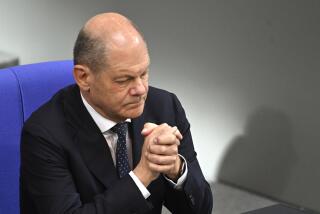Germany Unveils Loan Plan to Boost Economy : Local Governments, Small Businesses to Benefit From $12.7 Billion Offered at Low Interest Rates
- Share via
BONN — The West German government announced a low-cost loan program Wednesday designed to boost its sluggish economy and answer foreign critics, and economists say a reduction in interest rates will likely be announced today.
The loan program will pump money into local governments and small businesses by making $12.7 billion in new loans available at low interest rates.
The program was welcomed by U.S. Treasury Secretary James A. Baker III. The Treasury released a statement quoting Baker as saying: “If fully implemented, these measures should boost domestic demand in Germany and contribute to coordinated international efforts to reduce global imbalances.”
In addition, the West German central bank, the Bundesbank, is widely expected today to reduce the benchmark discount rate, now 3%, which should further stimulate growth.
Crank Up Growth
Financial analysts were confused when the central bank announced Wednesday that it would not hold a news conference after the meeting of the Bundesbank council, at which any changes would normally be announced. But some noted that a reduction could be made in any event.
Bankers expect a sizable cut in the discount rate. A government official hinted Tuesday that such a cut would likely total half a percentage point, which would put the rate at 2.5%, its lowest ever.
Chief government spokesman Friedhelm Ost told reporters that West Germany intended its economic package as a signal to reassure troubled world financial markets.
Finance Minister Gerhard Stoltenberg and Economics Minister Martin Bangemann unveiled the loan program, which will make low-cost loans to local governments, and market-rate but government-backed loans to small businesses.
They also said steps would be taken to deregulate the tightly controlled economy in a bid to crank up growth.
Washington and other industrialized nations have been pushing Bonn to stimulate its economy, with the aim of increasing imports from the United States.
The officials also said that West Germany was preparing for a new meeting of the powerful Group of Seven industrial nations. Chancellor Helmut Kohl asked Stoltenberg to study whether a new international monetary agreement was possible.
The Finance Ministry said: “The Chancellor has expressly asked the finance minister, in the urgent interests of the Federal Republic, to pursue (his) good international contacts and to assess if the conditions exist for a new accord.”
The G-7, which also includes the United States, Japan, Britain, France, Italy and Canada, is expected to meet soon to discuss further international monetary cooperation along the lines of last February’s Louvre Accord, which aimed at stabilizing the dollar.
Favors Renewal of Louvre Accord
Stoltenberg told a news conference: “We are in favor of a continuation and renewal of the Louvre Accord.”
But he warned that important questions still had to be clarified before a meeting could take place. Stoltenberg gave no details and did not indicate when a G-7 meeting might take place.
The Louvre Accord was threatened in October, partly because Treasury Secretary Baker accused West Germany of breaching the spirit of the pact by driving up its interest rates.
Recently, the Bundesbank has been pulling interest rates lower, including reductions last week in some less important rates.
The Bonn administration has been criticized for not doing enough to promote growth, which an independent council of economic advisers predicts will be as low as 1.5% in 1987 and 1988.
Bangemann says he hopes the planned economic measures will lift growth in 1988 to at least 2%.
The West Germans, for their part, have said Washington was not tackling its budget deficit problems and criticized the United States for periodically talking down the dollar, which is hovering just above record lows.
The West German government now appears to have agreed on its contribution to any G-7 meeting, where it would be able to point to the economic package and call on Washington to put its own economic house in order.
Former Economics Minister Count Otto Lambsdorff, economics spokesman of Bangemann’s liberal Free Democratic Party, said the investment program would only provoke “scornful laughter” from the United States.
The Federal Banking Assn. said it was doubtful that the plan would be enough to stimulate Western Europe’s largest economy. “Additional tax measures would be more effective,” it said.
More to Read
Sign up for Essential California
The most important California stories and recommendations in your inbox every morning.
You may occasionally receive promotional content from the Los Angeles Times.










